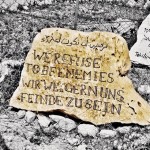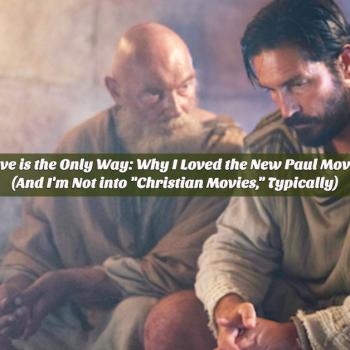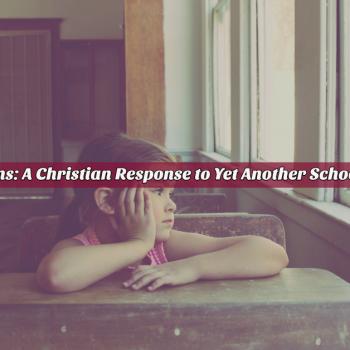Have you ever been pissed off? I realize that this is crude langauge for some, but it’s authentic language. Sometimes we are angered in a way that makes our blood boil. What are those anger-triggers for you?
Sometimes we get angry about things that really shouldn’t anger us. Coffee’s too cold. Coffee’s too hot (seasonal drama). Toilet paper’s too soft. Toilet paper’s too thin. Internet too slow. Traffic jam. Running late. Dishes dirty. Children’s poop issues. Dog’s poop issues. Your own poop issues (ok, enough with the dookie already). Rude restaurant server. Jerk cuts in line.
Sometimes we get angry in a way that is justified, of which the above examples don’t count. But in these understandable situations, anger can soon lead us into territory that is unproductive for the matter at hand, and our souls.
It seems to me that Jesus would invite us to move from anger to compassion. When we are pissed off, it might be helpful to put that energy elsewhere.
Dealing with Initial Anger in Israel/Palestine
Here’s the context of when I was briefly pissed off. I traveled into the West Bank for the first time in Palestine with The Global Immersion Project. Having met some wonderful Arab people in East Jerusalem (within the boundaries of Israel), I was frustrated as I learned of the living conditions of people in the West Bank. One example: the West Bank supplies water to Israel through an irrigation system but only get a rationed amount of water per month. If a family runs out of water – no shower, no cooking, and no drinking.
Many other examples of injustice could be cited. Sadly, many of the Israeli citizens are not fully aware of the situation… and if they are… fear drives them towards indifference in many cases.
As I entered this complex situation in Israel/Palestine, my heart was simultaneously angry and hurt. For a couple of days I wondered if there was any hope of reconciliation at all. Rather than dismiss my emotions, I chose to sit in the tension. I wanted to experience the full process of emotional, relational, and intellectual growth. As a pastor. As a student. As a human.
The temptation, of course, when we get “pissed off” at injustice, is to dehumanize those that we see as complicit in various forms of evil. Anger does exactly that – dehumanizes the “other.” Here, the scapegoat easily becomes the Israeli government and its citizens. But all dehumanization does is feed conflict and violence.
Rather, I chose to redirect my anger towards learning about how to do the hard work of peacemaking. Both sides are human. Both sides are wrong. Both sides are right. Both sides matter to God. Both sides should matter to us – even if one group, the one abusing power, is more to blame from our perspective.
Redirecting Anger: An Example
One person that modeled this to me on our trip is a man named Daoud Nasser whom I recently referred to as the next Dr. King or Gandhi. You can read more about his story as the founder of Tent of Nations here. In short, instead of being passive or violent or leaving – he and his family have chosen to stay in Palestine and to resist injustice through creative nonviolent resistance.
Our group sat down and listened to his story. His numerous examples of persevering through hardship blew us away as a group. After his casual presentation, we had a time for question and response. A question came up about how to deal with anger. Daoud’s response was one of the most important things I learned on this trip.
“For us, our therapy is – when we are frustrated we start thinking about a new project. We channel this pain to be invested.”
He went on to offer an example of this sort of shift in energy. When they saw Gaza was being bombed (which they could actually see from their hilltop property) they invested that anger into building a new cistern. What this led to is that “by evening we are tired… there is no room to hate.”
Some might wonder if this is a method for denying emotions. Rather, this is a chance to redirect and refocus anger in such a way as to put it to humanizing projects. This sort of shift might actually be a way to prevent us from dehumanizing the “other” party, even if they are the oppressors in the situation. Daoud adds:
“We are not running away from our problems… but it is a way to keep the positive spirit… When we focus on our vision, we don’t see our daily problems as huge problems. We see them as small obstacles.”
Daoud’s nugget of wisdom offers us a model for dealing with anger – both in the small things and in the big. When we are pissed off, what if we used that surge of energy to create good?
Creating Good When Anger Lurks
Denying our emotions isn’t healthy. Allowing emotions to control us, to master us, also defies health. Redirecting our anger when we get pissed off about small things might be a way to live into the freedom of Christ on a daily basis.
The same is true when we are mad about things worthy of being upset about: injustice. We can either allow it to lead us down the dark road of hatred and dehumanization or we can follow the path through our anger and into creating good. Daoud invites us to put this approach to the test: What would it look like for you to partner with like-minded people to turn frustration into fruition?
If we put Daoud’s method to the test we may just find that glimpses of Jesus begin to emerge in some of the most dire of situations. May anger not be our master but may our Master transform us to be the kind of people who create good in our neighborhoods, cities, and world.
———————————————————————————————————————-
Free Audio Download of our Conversation with Daoud Nasser
The following audio comes to you as a gift from The Global Immersion Project. This is a recording of our time with Daoud while we chatted with him in his cave at Tent of Nations.
Tent of Nations – Daoud Nasser
Want to Experience Peacemaking and History in Israel/Palestine?
Over the past couple of months I’ve occasionally posted my reflections from an experience I had with The Global Immersion Project. If you want to read other reflections, check out: “A Land Without a People for a People without a Land?” or “The Art of Resistance: Bansky, Memory, & Hope” or “We Refuse to Be Enemies: The Next Dr. King or Gandhi lives in Palestine.” I should simply add that TGIP continues to make an impact on my life, both my personal reflections and my guidance of our new church. In fact, I hope to take another trip with TGIP in the near-future. This trip would primarily be for leaders within my faith community, but would involve a few others as well. All of that to say: if you want to visit the Holy Land and if you want training in active peacemaking – TGIP is THE organization to go with!












